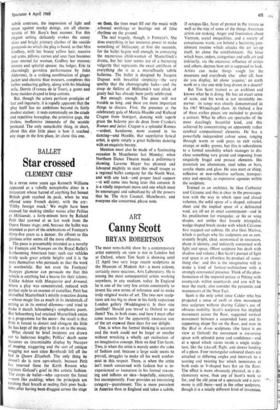Star crossed
BALLET • CLEMENT CRISP
In a revue some years ago Kenneth Williams appeared as a rabidly xenophobic diner in s restaurant whose hatred otanything but honest British grub reached it& peak, when he was offered some French dainty, with the cry: 'Filthy foreign muck.' We might have been excused for making similar noises after Pelleas et Melisande, a forty-minute bore by Roland Petit that yawned at us last week from the Opera House stage; and, because the ballet was intended as part of the celebrations of Fonteyn's thirty-five years as a dancer, the affront to this glorious artist seems all the more offensive.
The piece is presumably intended as a novelty for Fonteyn and Nureyev on the Royal Ballet's forthcoming American tour; such star vehicles rarely scale great artistic heights and it is the stars themselves who persuade us that the work is worthwhile. But not even the Fonteyn/ Nureyev glamour can persuade me that this vehicle is anything but a hearse for their talents. Unlike Ashton with Marguerite and Armand, where a play was concentrated, reduced with perfect style to an essence of camellias, Petit has shrivelled Maeterlinck's mistily evocative drama —whose magic lies as much in its incidentals of setting as in its central dilemma—and tried to make it match Schoenberg's symphonic poem. But Schoenberg had retained Maeterlinck entire as a programme for his score: the result is that Petit is forced to distort and elongate the little he bas kept Of the play to fit it on to the music.
What should be brief incidents are drawn out to ludicrous lengths; Pelleas' death scene becomes an interminable display by Nureyev of moping, staggering and the sort of antique mugging not seen since Bernhardt fell off the bed in Queen Elizabeth. The only thing he doesn't do is turn cart-wheels, because Petit has reserved these for Keith Rosson who registers Golaud's grief, in this artistic fashion. The corps de ballet—who represent the forest —seem like padding; when the principals are catching their breath or resting their poor back- sides after having been dragged across the stage - on them, the trees must fill out the music with arboreal writhings or beatings out of false rhythms on the ground.
The real tragedy, though, is Fonteyn's. She does everything in her immense power to make something of Melisande; at first she succeeds, for the ballet begins well enough, in conveying the mysterious child-woman of Maeterlinck's drama, but her later scenes are of a hectoring vulgarity that represents the exact antithesis of everything she is as a marvellously subtle ballerina. The ballet is designed by Jacques Dupont with beautiful simplicity—the very quality that the choreography lacks—and the coup de theatre of Melisande's vast cloak of gauzy hair has already been justly celebrated.
But enough, enough. The piece will not trouble us long, and there are more important things to discuss. First, the presence at the celebratory gala of Marcia Haydie and Richard Cragun from Stuttgart, dancing with superb grace the balcony pas de deux from Cranko's Romeo and Juliet. Cragun is a splendid Romeo —ardent, handsome, most assured in his dancing—and Haydde, that superlative lyrical artist, is quite simply a great ballerina dancing with an exquisite beauty.
Mention must also be made of a fascinating occasion in Manchester last Monday, when Northern Dance Theatre made.- a preliminary showing. Laverne Mayer has planned and laboured mightily to start this small troupe as a regional ballet company for the North West, and with any luck—and proper local support —it will come into being later this autumn. It is a vitally important move and one which must be encouraged and subsidised by all the powers that be. The Arts Council, Manchester, and everyone else concerned, please note.


































 Previous page
Previous page